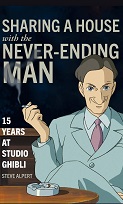Review of 'Sharing a House with the Never-Ending Man: 15 Years at Studio Ghibli'
Sharing a House with the Never-Ending Man: 15 Years at Studio Ghibli by Steve Alpert
 This book tells the story of Steve Alpert's 15 years at Studio Ghibli. The only “gaijin” working for Studio Ghibli, Alpert, a fluent Japanese speaking American, was responsible for distributing Ghibli films to the international market including international block-busting Princess Mononoke and, later, Spirited Away. The director of these films, Hayao Miyazaki is a Japanese national treasure and very protective of his work, strong willed (if he says “no” there is no discussion) but also very mischievous with many quirks Alpert shares here.
This book tells the story of Steve Alpert's 15 years at Studio Ghibli. The only “gaijin” working for Studio Ghibli, Alpert, a fluent Japanese speaking American, was responsible for distributing Ghibli films to the international market including international block-busting Princess Mononoke and, later, Spirited Away. The director of these films, Hayao Miyazaki is a Japanese national treasure and very protective of his work, strong willed (if he says “no” there is no discussion) but also very mischievous with many quirks Alpert shares here.
Alpert worked very closely with Ghibli producer Toshio Suzuki but also had dealings with the larger-than-live head of Ghibli's parent company Tokuma Shoten, Yasuyoshi Tokuma whose funeral is discussed here in some detail. Much of this book focuses on the quirks of these men as well as how business is actually done in Japan including the propensity for meetings in which conclusions are presented rather than discussed (as they have been agreed in multiple pre-meetings) and the, perhaps expected, formality of much of it mixed with critical decisions being personally made over glasses of beer.
Much of Albert's work, in addition to his obvious role as business translator, consisted of negotiations with their major American distributor, Disney, who expressed concerns regarding content they would not normally have in their animated features. This was new territory for Disney and here is detailed some of the teething pains they went through to bring these masterpieces to an English audience including the tortuous dubbing process on Princess Mononoke.
This book will no doubt be of interest to any fan of Studio Ghibli or the Japanese anime industry. I did find it a bit disjointed with the chapters certainly not arranged chronographically and the narrative switching in styles between chapters as well from a detailed description of what happened in a particular meeting or event to a sweeping discussion of Japanese meeting etiquette, however, at no time did I find it boring. Think of “Sharing a House” as more a memoir than an autobiography and, indeed, we hear very little of Alpert's personal life the focus here being very much on Ghibli.
An interesting and fascinating insight into Studio Ghibli and Japanese business culture.
Rating: “Nearly perfect, but not quite”
Review Date: 2023-05-27
Genre: Non-Fiction
Publisher: Stone Bridge Press
Publication Date: 2020
ISBN: 9781611720570